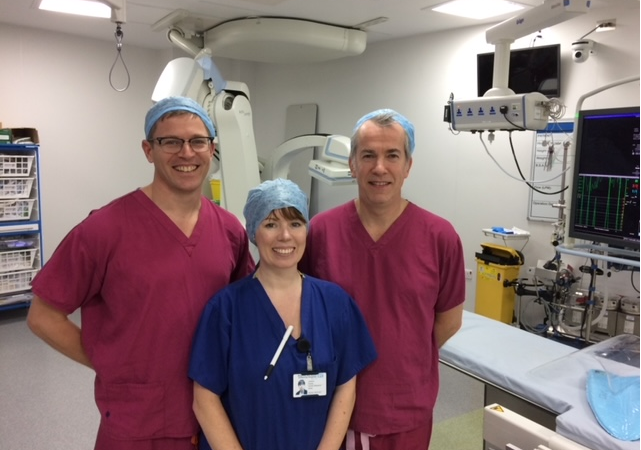
University Hospitals Sussex NHS Foundation Trust cardiologists and UK heart valve disease charity, Heart Valve Voice, are offering free heart checks from a pop-up bus in the city in an attempt to find people who may be unaware that they have heart valve disease.
On Tuesday May 24 from 10am to 3pm, the team will be at Hove Lawns on a blue ‘Your Heart Matters ’bus. They will be offering advice to the people of Brighton about heart valve disease, and there will be the opportunity to have a heart rhythm check and a stethoscope check (cardiac auscultation) which detects heart valve disease.
This event is part of a year-long campaign across 12 cities in the UK to raise awareness of heart valve disease.
So far over 1,000 hearts have been listened to, and over 100 previously undetected cardiac conditions have been found.
While heart valve disease predominantly affects over 65s, early detection is encouraged so the team are looking to listen to the beat of the heart of anyone over 50.
The team from University Hospitals Sussex will include consultants, senior trainees, physiologists and specialist nurses who all care for patients with heart valve disease, as well as Heart Valve Voice patient advocates. On the day, anyone who is diagnosed with a heart murmur or irregular pulse will be given a letter to share with their GP for further investigations.
The team is collaborating with Valve for Life and Heart Valve Voice to empower patients to access healthcare and raise public awareness of these heart valve conditions.
Brighton has been chosen as one of the cities as it has a worldwide reputation for providing world class cardiac care.
Structural intervention using new and novel key hole technologies is one of the major strengths of the Sussex Cardiac Centre, based in Brighton.
The Trust is involved in a number of clinical trials that have offered new and pioneering techniques to our local patients and in August last year UHSussex did the first fully mitral valve replacement using novel technology in the UK.
Members of the team are currently attending a world leading cardiology conference in Paris, where UHSussex clinicians, Professor David Hilldick-Smith and Dr James Cockburn have been presenting before a global audience.
Dr Cockburn, a cardiac surgeon at University Hospitals Sussex, said: “As heart specialists, we often find that patients ask for help too late – this can have serious consequences, particularly for those with heart disease. These issues have worsened over the last couple of years.
“This initiative is a great opportunity for the people of Brighton and Hove, and for anyone who wants to come along, to have direct access to cardiology professionals and in particular have a pulse check and be assessed for heart valve disease”
Heart Valve Voice CEO, Wil Woan, said: “We are looking forward to providing education to the people of Brighton and hope to raise awareness that a simple stethoscope check could identify important heart disease. On the day, trained cardiologists will be on hand to perform cardiac auscultation and give immediate feedback to members of the public, which could save lives.”
Heart valve disease affects 1.5million people in the UK and can be fatal if untreated. Most serious heart valve disorders can be detected by listening to the heart with a stethoscope. A trained health professional can detect a ‘heart murmur’, an abnormal heart sound, by listening to the heart, and this may indicate a heart valve problem. A recent study found that there are approximately 300,000 people in the UK living with severe aortic stenosis. If left untreated, 50% of patients with severe aortic stenosis will die within two years.
Heart valve disease in the UK is often undetected because heart auscultation (listening to the heart) is performed less frequently than elsewhere in the world. This has been compounded by the impact of COVID-19 with fewer patients accessing face to face consultations and so less opportunity to detect heart valve disease with a stethoscope.
Phil Read, from Worthing, is an advocate of Heart Valve Voice – for good reason.
In 2019 after suffering a collapse at his home he was rushed to hospital and found to have mitral valve disease.
Just before Christmas in 2020 he collapsed again, and it was found his disease had deteriorated and he had surgery in December 2021.
He is now back on the mend, back at work, and has been back on his bike for the first time since his operation.
Phil said: “I was treated for heart valve disease in December last year. Heart valve disease is a serious condition, but I know from my experience that getting it diagnosed early and getting on a treatment pathway is essential.
“Despite the delays to my surgery caused by Covid, I’m now back at work, back enjoying time with my wife and kids, and now I’m trying to give back to those who helped me. I’d encourage anyone worried about their heart health to come down to Hove Lawns for a free heart check and to learn more.”
One treatment for the disease of the aortic heart valve is transcatheter aortic valve implantation (TAVI). TAVI was developed as an alternative to open-heart surgery and involves putting a new heart valve in place using a less invasive (‘keyhole’) approach. It is most commonly performed under local anaesthetic through an artery in the top of the leg, and the benefits include a faster recovery time. UHSussex is one of the place in the UK where this can take place.